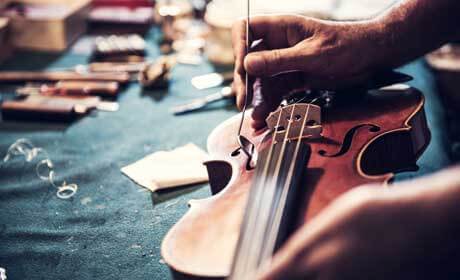Earlier this year I had the privilege of sitting down with Harriet Mackenzie to discuss both her musical career and her experience with investing.
Harriet is an internationally renowned concerto soloist and has performed across five continents, with recordings including concertos with the Royal Philharmonic Orchestra, Orchestra Nova and the English Symphony Orchestra.
Hi Harriet, at Quilter Cheviot we are passionate about supporting the arts and I’m delighted to have the opportunity to interview you. Now, you are an incredibly successful concerto soloist, but I would like to begin by asking you how you got started as a musician? Who, or what, inspired you to first pick up a violin?
First of all, thank you for interviewing me and thank you so much for your support of the arts. I started playing violin just before my fifth birthday after a long, hard and focused campaign towards my parents which began from the age of three! Even at that age I knew I wanted to do that – and I also wanted to be a composer. It’s hard to explain where such a fierce ‘need’ came from. My sisters were both playing - one the violin and the other the cello - so they were an early influence and inspiration. I remember listening to my sister practising the violin when I was in bed, and I was desperate to play too. I literally used to pray that I would be allowed to do that too.
In the end, frustrated with my parents’ inaction and excuses “you’re too young… it’s too expensive”, I plucked up the courage and asked the teacher myself. She was so impressed with my determination and my aching need to play the violin that she put me top of her waiting list and I started in group lessons. I was incredibly lucky to study with such an inspiring, creative teacher – Sheila Nelson - and I will always be grateful to her. I owe her so much. I was always obsessed with the sound of the violin. There is something intangible about the exquisite, but deeply human sound, that resonated with me on a deeper level. Even as a toddler I wanted to create that. Being on stage and performing was secondary and a by-product of that urge to create beauty.
One of my main inspirations as an investment manager is Warren Buffet. A quote of his I particularly like is “the best investment you can make, is an investment in yourself”. You have obviously invested heavily in yourself, spending 1000s of hours honing your craft. What have you used as your motivation for this?
There are many motivations - the great violinist Heifetz summed up the demands needed to be a soloist: "It requires the nerves of a bullfighter, the stamina of a woman running a nightclub and the concentration of a Buddhist monk" (as written in 'Gregor Piatigorski: The Life and Career of the Virtuoso Cellist' by Terry King, at a point when Heifezt and Piatigorski were both feeling the strains of touring and performing in the autumns of their lives.) I would add to these that one needs one’s fingers to have the flexibility of the top acrobat; one needs to be a magician, to have the same sense of illusion as a conjurer whipping the tablecloth from a fully, formally set table complete with china and cutlery, making the fierce technical demands look possible. And even effortless. We are always aiming for an impossible, moving ideal. The music itself is a calling to one’s soul, that is the biggest motivation. To be able to play to the highest standard possible means being very disciplined physically, mentally and to be constantly trying to improve oneself.
In my practise, I aim for perfection. On stage, I hope that the aim from my practise has put things securely in place to be able to forget that the notes are even there and to just focus on the message of the composer and the emotions of the music. That is what I believe is important as an artist. As Beethoven said: “To play a wrong note is insignificant; to play without passion is inexcusable.” To be able to experience something that raises humanity above the everyday - to connect beyond borders and experience emotions which words cannot convey.
I would also mention that as well as performing in all the high-profile concert halls around the world, I have also been lucky to work a lot bringing music to those with little, or no access to live music – in prisons, care-homes, hospitals, special schools and dementia patients. There have been countless moving experiences from these concerts which I will never forget. For example, dementia patients who have lost the ability to speak will suddenly burst into song – and sing all the words! Their carers and family present are often speechless themselves then! There was one particular concert where we were doing an interactive concert for adults with special needs, there was one lady – Angie - who had never uttered a word, nor managed to sign, for the whole of her life. We put signs to match with the music that we were playing – harmonics were butterflies, pizzicato was falling rain etc so that they could interact when we were playing. Angie started to make the sign for rain as we played the pizzicato. The carers all started crying. She had made a connection and communicated something for the first time in her life.
These experiences are transformative – not least for us musicians - and truly life-changing. The power of live music, the life-enhancing properties are proved to me again and again. This is a constant motivator. I believe in the transformational power of music and if I can bring people on that journey with me, if I can move them with my music, then I feel like I have achieved something important.


